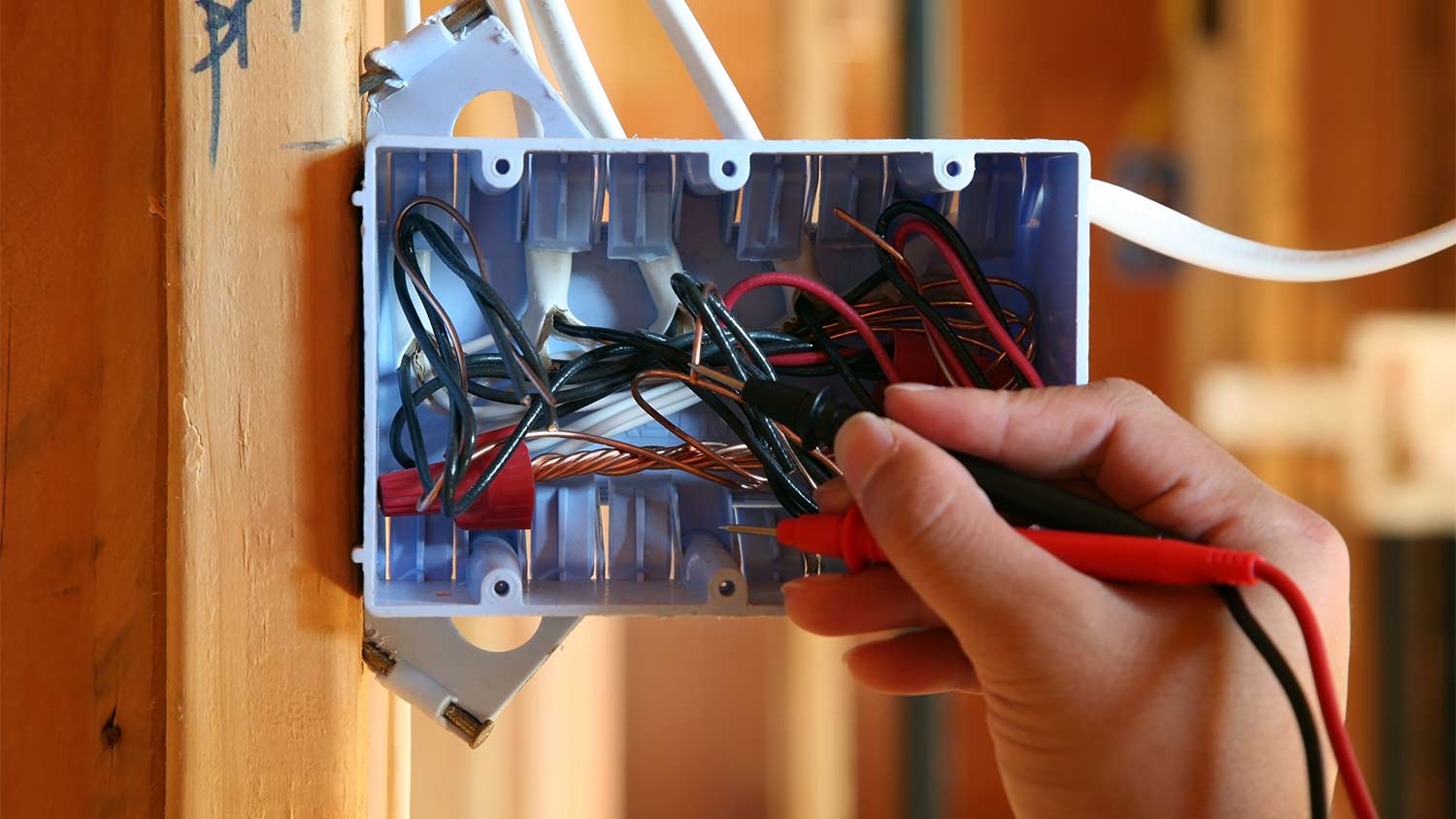What Is a Short Circuit, and How Can You Prevent One?
Don’t short circuit over a short circuit


Short circuits occur when an electrical current travels outside of the circuit.
Short-circuiting can cause fires, damage, and electrical shock.
Signs of a short circuit include sparks, popping sounds, and burning smells.
You should call a licensed electrician to find and fix the source of the short circuit.
While you may not think twice about a sudden breaker trip in your older home, a short circuit is a serious event that can trip a breaker. Short circuits can put your home at risk of structural fires and electrocution. Read this guide to learn about what a short circuit is and what you can do to identify, fix, and prevent short circuits in your home’s electrical system.
What Is a Short Circuit?
A short circuit is a situation where an electrical current flows abnormally through two conductors in a circuit, causing an overload. The current in the circuit travels down an undesignated pathway with minimal or no electrical resistance. A short circuit can damage the outlet, device, or light fixture, leading to a structural fire. If you’re in the wrong place at the wrong time, it can even cause electrical shock.
Short Circuit Causes
Several causes can lead to electrical short circuits. Knowing the causes can help you jump into action when a short circuit occurs. Here are some of the most common causes of a short circuit:
Water exposure to your electrical wiring
Loosened wires around the terminals in the electrical receptacle box
Poor insulation or lack of electrical tape around the wires
Old, damaged, or frayed wires
Electrical surges
Deteriorated cables
Signs of a Short Circuit

When a short circuit occurs, you won’t always know that it’s about to happen. However, there are signs you can familiarize yourself with to increase your likelihood of detecting a short circuit sooner. Signs of a short circuit include:
Telltale sounds like sparks, buzzing, or popping sounds
A blown fuse or tripped circuit
Flickering or dimming light fixtures
Charred light switches or faceplates
Burning smells
Types of Short Circuits
Two types of short circuits can happen in your home. You can have a normal short circuit, which occurs when a hot wire gets in contact with a neutral wire, or a ground-fault short circuit, where a hot wire comes in contact with a grounded surface.
How to Protect Your Home From Short Circuits

To help protect your home from short circuits, electrical systems can have five main defense mechanisms: circuit breakers, fuse boxes, surge protectors, ground-fault circuit interrupters, and arc-fault circuit interrupters.
Circuit Breakers
Circuit breakers function like resettable fuses. When a circuit breaker detects a change in the flow of an electrical current in your home, it quickly breaks the connection by switching off the breaker to that circuit, also known as tripping the circuit breaker.
Fuse Boxes
Older homes may have fuse boxes versus circuit breakers. Fuses work similarly to circuit breakers. In the presence of an electrical current overload, the fuse blows to protect your home from electrical damage or fires.
Surge Protectors
To protect your electronics from short-circuiting, surge protectors can help prevent electrical surges from reaching your devices. Installing a whole-house surge protector offers the best protection from electrical surges in your home.
Ground-Fault Circuit Interrupters
A ground-fault circuit interrupter (GFCI) outlet helps protect you from electrocution. These outlets continuously detect currents in a circuit and automatically interrupt electricity in the presence of a ground fault.
Arc-Fault Circuit
Also called an arc-fault detection device, arc-fault circuit interrupters (AFCIs) help to prevent electrical fires in homes and buildings. AFCIs detect abnormal arcing conditions and work best in combination with GFCIs to protect your home from circuit faults.
How to Fix a Short Circuit
In most cases, you’ll need a professional to fix a short circuit. Electrical repairs can be dangerous if you don’t have experience dealing with live wires, electricity, and circuits. At the same time, some issues with your electrical system that cause short circuits are easier to fix than others.
Before you call in the pros, you can follow these steps to narrow down the cause of your short circuit to see if you can fix the issue at home.
Look in your electric service panel to see if there are any tripped circuit breakers.
Inspect the outlets in the room or rooms associated with the tripped circuit breaker.
Be on the lookout for signs of damaged devices, light switches, or outlets.
Turn off the power, and check inside electrical receptacle boxes and light fixtures for issues with the wiring.
If possible, scan wires in your walls with a flashlight for rodent damage or corrosion.
When to Call the Pro
Finding a short circuit can feel like searching for a needle in a haystack if you’re unfamiliar with electrical wiring. Not to mention, it’s dangerous for the average homeowner to tinker with electricity. The fastest and headache-free way to get to the bottom of electrical issues in your home is to contact a certified electrician near you.
Some simple short circuit causes are easier to fix than others, but most homeowners should not try to DIY a short circuit repair without electrical experience. Your safest option for preventing electrical fires and electrocution in your home is to contact a licensed electrician to handle fixing a short circuit in your home.
The cost to repair a short circuit depends on the type of repair. A faulty outlet or simple loose wire can be a simple fix that might only cost a handful of dollars. For example, if you need to rewire a house, you’ll spend around $2 to $4 per square foot, but replacing an entire electrical panel costs anywhere from $500 to $2,100.





- Home Generator Repair
- Lamp Repair
- Electric Repair
- Generator Installation
- TV Antenna Services
- Emergency Electricians
- Commercial Electricians
- Attic Fan Installation
- Attic Fan Repair
- Exhaust Fan Installation
- Electric Inspectors
- Subcontractors
- Electrical Construction
- EV Charger Installer
- Chandelier Installation
- Doorbell Installation
- Bathroom Fan Installation
- Ring Installers
- Electrical Panel Upgrade










